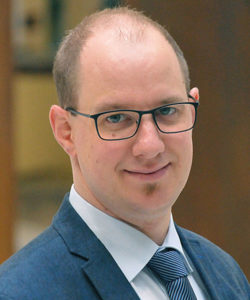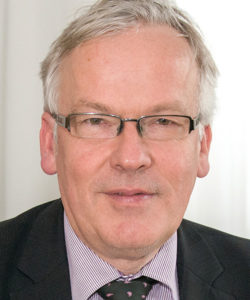
Forum I: Vocational Education and Training 4.0 – initial and continuing training in the digital ageForum head: Torben Padur |

|
Increasing digitalisation of the world of work is creating a wide range of challenges for the vocational education and training system. Digitalisation is bringing about a shift in technologies, products, work processes, business models and ultimately in the tasks performed by skilled workers. It is also accelerating the pace of change.
Forum I will look at how this transformation process is being shaped. It will be opened by BIBB President Friedrich Hubert Esser, who will give a keynote presentation on the topic of “Vocational Education and Training 4.0 – challenges and perspectives for the vocational training of the future”. Professor Esser will give specific details of the outcomes that have emerged from work carried out thus far and will also provide a forecast of the main activity focuses that BIBB will pursue in future.
Forum I will take a consideration of the employment system as a basis for debating the question of how vocational education and training can be attractively structured in times of digital change. Relevant results of current research in this specialist area will be presented to a specialist audience for the first time. Alongside issues such as the possible future design of modern curricula for initial and continuing training and the potential nature of contemporary company-based training organisation, we will also discuss where new fields of employment are emerging and what sort of suitable training pathways can be created. These topics are an equal focus of attention amongst those responsible for initial and continuing education and training at companies, employer associations, trade unions, competent bodies, vocational schools and educational institutions.
Forum I is the only place where you will receive first-hand responses from recognised experts in the field.
Forum II: Learning venues with a future: cooperative and digitalForum heads: Prof. Dr. Michael Heister / Franziska Kupfer |


|
The learning venues of the vocational school and the company are the central characteristic of the dual system and serve the purpose of imparting employability skills. They are supplemented by inter-company vocational training centres, which perform important training tasks in the craft trade sector in particular. This forum will focus on vocational education and training practice at the various learning venues and on their stakeholders, VET staff.
In his opening address, Detlef Buschfeld, Professor of Vocational and Business Education at the University of Cologne and Chair of BIBB’s Research Council, will provide a critical and controversial description of the potential which exists in this area and of the cooperation that takes place between learning venues.
Dual vocational education and training is facing a multitude of challenges. The ways in which daily training practice needs to change are, for example, emerging ever more clearly against the background of ongoing digitalisation. Vocational education and training increasingly means imparting the necessary competencies to deal with technologies and work processes that are undergoing rapid change. The learning venues must be able to anticipate this development and continue to pursue the appropriate training contents and methods. The speakers at the forum will address the topic of change by presenting projects of practical relevance and results from programmes and pilot schemes aimed at creating an attractive form of vocational education and training. The prerequisites for and opportunities of cooperation between learning venues will also be explored. We are looking forward to the highly interesting and productive networking that Forum II will bring!
Forum III: Work-based learning – occupational competence in Europe and the worldForum head: Isabelle Le Mouillour / (Hans-Gerhard Reh) |

|
The concept of work-based learning has increasingly found its way into vocational education and training policy over recent years. Both international and European organisations recognise the necessity for vocational education and training to consider the way in which learning within the work process is shaped.
The aim of the forum is to debate the various work-based learning models both nationally and internationally with regard to the acquisition of occupational competencies from the point of view of the companies providing training and the vocational schools. Discussions will be based on national and international research results and examples from practice.
The forum will be opened by Dr. James Calleja from the European Centre for the Development of Vocational Training (CEDEFOP), who will speak on the topic of “Integration of company-based learning in vocational training in Europe – which contents and forms?”
The aim is that participants in Forum III should use a consideration of the commonalities and differences that exist between the models as a vehicle for discussing the factors which may particularly foster (or inhibit) competence acquisition within the scope of work-based learning. Network with others on the challenges you face and seek inspiration from current practical examples and the very latest research findings!
Forum IV: School, and then what? Dual vocational education and training – preferences and realityForum heads: Prof. Dr. Elisabeth M. Krekel / Dr. Friedel Schier |


|
The question regarding “attractiveness of vocational education and training” is one that has been posed for more than 25 years. Public debate sheds light on a variety of aspects. How attractive is vocational education and training and for whom? Why are fewer and fewer young people enthused by vocational education and training? How can companies obtain enough young employees and skilled workers? And, how can the effectiveness of a VET structure which acts as the key pillar of the German economic system be strengthened in overall terms? These and other issues will be debated from a range of points of view. Presentations will shed light on the perspective of young people and of the companies and will also consider vocational education and training from a European angle.
The topic of the forum is connected with the debate surrounding the attractiveness of dual VET. Against this background, Forum IV will be seeking to
Forum V: Migration and integration – the contribution of vocational trainingForum head: Katharina Kanschat |

|
One in five persons living in Germany are from a migrant background, and more than half of this group
hold German citizenship. A fifth of new companies in the country are also set up by persons of foreign
extraction. In addition to this, hundreds of thousands of people have also fled to Germany since 2015 in
order to seek protection from war, violence and intimidation.
This will form the background for debate within Forum V on the challenges and opportunities of integration into vocational education and training. The opening address “Migration awareness as a core professional competence” will be presented by Professor Aladin El-Mafaalani from the Ministry of Children, the Family, Refugees and Integration (MKFFI) of the State of North Rhine-Westphalia.
Education is the key to integration. This is an area in which vocational education and training has proved itself to be a particularly effective tool. At the same time, however, there is scope to pick up the pace and improve things still further by redoubling our efforts to facilitate entry to the world of work in Germany or in the respective home countries of migrants and refugees.
Research results which will assist vocational education and training in this quest are already available and now need to be instigated further. The field of practice offers a plethora of good examples of how successful integration into VET and work can take place. These will form an object of detailed debate. A final podium discussion to be chaired by BIBB President Friedrich Hubert Esser will forecast the action that will need to be taken in future from the point of view of decision makers in the areas of policy making, trade and industry, academic research and practice.
Forum VI: Healthcare and nursing: perspectives for vocational education and trainingForum heads: Anita Milolaza / Torben Padur |


|
The Nursing Act has introduced a new and generalist form of nursing training. This will enable those who complete it to work in all areas of care, including general nursing, paediatric nursing and geriatric nursing. The new training programmes will begin in 2020.
The forum will begin with a keynote speech that examines the future of nursing and highlights the growing significance of this particular field of employment. The management of the Office of the Specialist Committee for the new Nursing Act, a new body to be set up at BIBB, will then be on hand to talk about the status of implementation of the new nursing training and present specific examples from practice.
As well as considering the new generalist nursing training, this forum will also focus on the answering of essential questions relating to initial and continuing vocational education and training in the healthcare professions by proven experts in the field. The impacts of digitalisation on craft trade occupations in the healthcare sector, the establishment of a modern culture of continuing education and training in geriatric nursing and the deployment of digital media in initial and continuing vocational education and training are all further topics that will be addressed. Relevant research work will always be backed up by current examples from practice.
All of this means that the forum will offer an outstanding platform to discuss the future organisation of initial and further training in nursing and healthcare for all relevant stakeholders from the fields of academic research, practice and policy making.